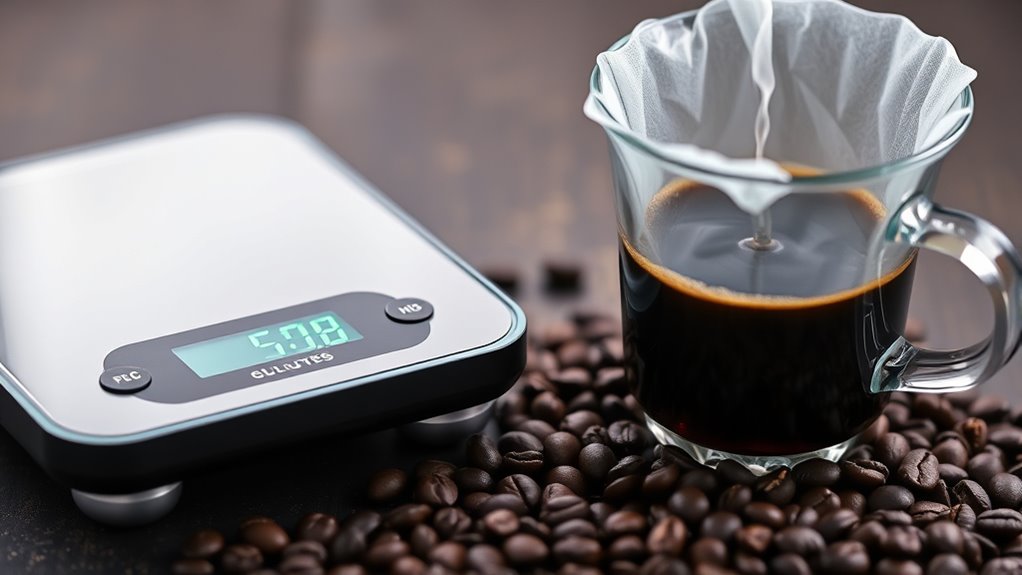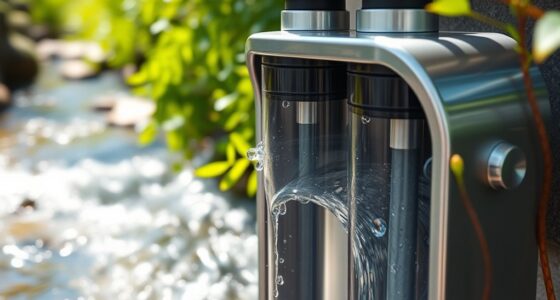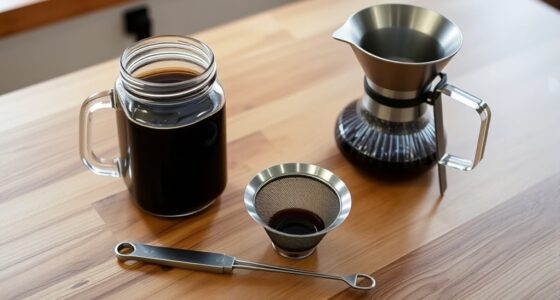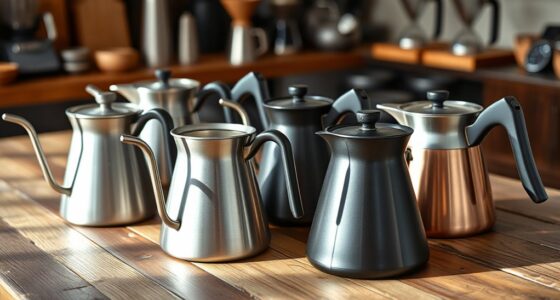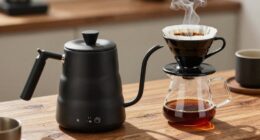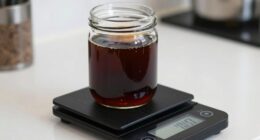Using a coffee scale to measure by weight matters because it guarantees your brews are consistent, accurate, and repeatable. Unlike volume, weighing controls variables like coffee density and grind size, leading to better flavor and extraction. It helps you fine-tune ratios and avoid guesswork, giving you more control over your brew. Keep exploring how precision can elevate your coffee game and open even better results in every cup.
Key Takeaways
- Brewing by weight ensures precise measurement of coffee and water, leading to consistent and flavorful results.
- Using a coffee scale reduces variability caused by differences in density, packing, and scoop sizes.
- Weighing ingredients allows for accurate control of coffee-to-water ratios, optimizing flavor extraction.
- Volume measurements can be inaccurate due to inconsistent grind sizes and packing, affecting brew quality.
- A scale promotes disciplined, repeatable brewing practices that improve overall coffee craftsmanship.
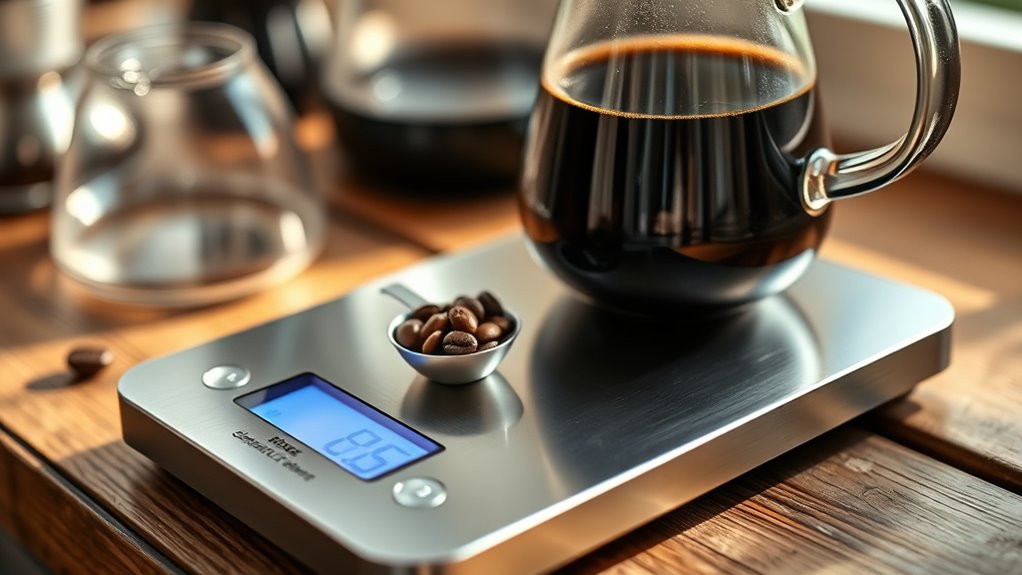
A coffee scale is an essential tool for anyone serious about brewing the perfect cup. It helps you measure your coffee and water precisely, guaranteeing that every brew is consistent and flavorful. When you use a scale, you’re taking control of your process, which means better grind consistency and more reliable flavor accuracy. Unlike using volume measurements, weighing your ingredients leaves less room for error, giving you a much higher chance of replicating your ideal brew each time.
One of the biggest advantages of using a coffee scale is how it improves grind consistency. When you measure your coffee by weight, you guarantee that each grind is uniform, which is vital for even extraction. A consistent grind size means hot water flows through the coffee grounds evenly, extracting the full range of flavors. Without a scale, you might eyeball your measurements or use scoops, which can vary considerably from one brew to the next. This inconsistency can lead to over-extraction or under-extraction, resulting in bitter or weak coffee. By weighing your coffee, you set a standard that stays the same every time, making your grind size more predictable and your brew more reliable.
Flavor accuracy is another key benefit of brewing with a scale. When you measure your coffee and water precisely, you control the variables that directly impact taste. This precision allows you to fine-tune your ratios for the perfect balance of strength and flavor. Volume measurements, like scoops or cups, don’t account for differences in density or how tightly coffee is packed, which can throw off your ratios. Weighing your ingredients ensures you’re using the exact amount needed, so your coffee’s flavor profile remains consistent and true to your preferences. Over time, this accuracy helps you develop a better understanding of how different amounts influence taste, enabling you to experiment confidently and improve your brewing skills.
Switching to a coffee scale might seem like a small change, but it makes a substantial difference. It encourages a more disciplined approach and removes guesswork from your process. Whether you’re brewing a pour-over, French press, or espresso, weighing your ingredients offers a level of precision that volume measurements simply can’t match. This consistency in measurement translates into greater control over grind size, extraction, and ultimately, flavor. Using a precise measuring tool ensures your ratios stay consistent, making each cup as good as the last. If you’re committed to elevating your coffee game, investing in a good scale is one of the best steps you can take. It’s a small tool that unlocks a world of precision, flavor, and repeatability, helping you craft coffee that’s exactly how you want it—every single time.
Frequently Asked Questions
Can I Use a Kitchen Scale for Coffee Brewing?
You can definitely use a kitchen scale for coffee brewing, but make sure it’s precise enough to measure your coffee grind and water accurately. A good scale helps you control brew temperature and ensures consistent results. Look for one with a tare function and good sensitivity. This way, you’ll get the right coffee-to-water ratio, improving flavor and aroma. Precision makes all the difference in brewing a perfect cup every time.
How Do I Calibrate My Coffee Scale?
Imagine your coffee scale as a trusted compass guiding your brew. To achieve precision calibration, start with your calibration tools, like calibration weights or a reliable known weight. Place the weight on the scale, then adjust the scale’s settings if it shows the wrong number. Repeat this process to guarantee accuracy. Proper calibration turns your scale into a precise tool, helping you measure coffee and water perfectly every time.
What Is the Ideal Weight-To-Water Ratio?
The ideal weight-to-water ratio for brewing coffee is typically 1:15 to 1:17, depending on your preferred strength. You should adjust based on your grind size and water temperature; a finer grind or higher temperature may require a slightly stronger ratio. Use your coffee scale to measure accurately, ensuring consistency. Experiment within this range to find the perfect balance that highlights your preferred flavor profile.
Are Digital Scales More Accurate Than Analog?
Digital scales generally offer more precise measurement than analog ones, making them better for brewing coffee. You’ll find that digital equipment provides consistent and reliable readings, which is vital for precision measurement. Plus, they’re often easier to use and read, enhancing equipment reliability. Whether you’re a beginner or an experienced barista, a digital scale helps you achieve the perfect brew every time, thanks to its accuracy.
How Often Should I Replace My Coffee Scale Battery?
You should replace your coffee scale battery when it starts showing low battery warnings or the display dims. Regular battery maintenance helps guarantee accurate measurements and extends your scale’s lifespan. Check your scale’s instructions for specific recommendations, but generally, replacing batteries every 6 to 12 months keeps it functioning properly. Proper care prevents inaccuracies that could affect your brewing process and maintains the scale’s overall durability.
Conclusion
Using a coffee scale transforms your brewing experience, ensuring consistency and better flavor. Did you know that even a 1-gram difference in coffee-to-water ratio can alter your brew’s taste considerably? By measuring weight rather than volume, you gain precision and confidence in every cup. So, investing in a good scale isn’t just about accuracy—it’s about revealing the full potential of your favorite beans. Brew smarter, taste better, and enjoy every sip!
